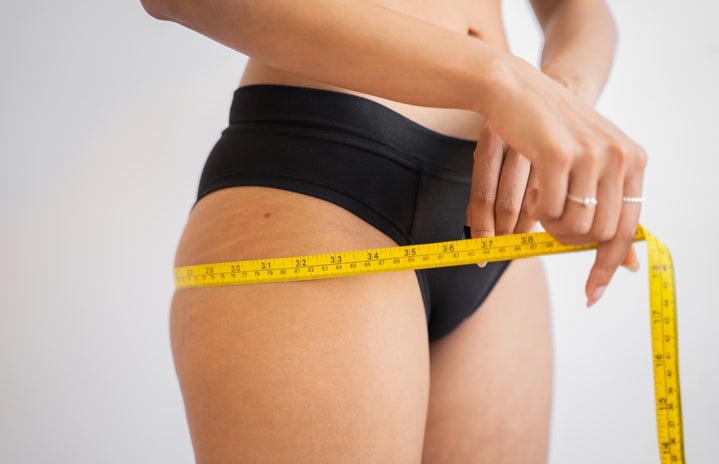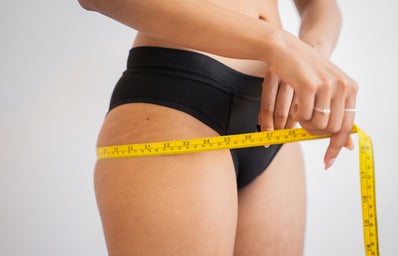*Sensitive topics: body image, dieting and eating disorders*
“I shouldn’t be eating this; it will make me fat”. “I really need to reduce my calorie intake.” “I should really lose weight”. Let’s be honest; who hasn’t thought or said these phrases out loud, when indulging into sweet treats in front of a Netflix series or a nice meal? Who hasn’t tried to eat less carbs, sugar, or other nutrients that are deemed cursed by the ‘fitness world’? Who hasn’t flicked through a women’s magazine in the search for the ‘perfect diet’ and then tried the latter out for one week? Very few people! But what is the cause for all of these interrogations? The answer in two words; diet culture. The latter is, in my opinion, the new poison of our society and affects us all in different ways.
First of all, what exactly is diet culture?
Unfortunately, there is no exact definition of the term ‘diet culture’, because it can be interpreted in numerous different ways. In short, diet culture is “a belief system that focuses on and values weight, shape, and size over well-being. Variations of diet culture also include rigid eating patterns that on the surface are in the name of health, but in reality, are about weight shape or size.” [1] In other words, diet culture is not only solely about diets, but goes way deeper; it is about making thinness the ultimate end goal, and therefore perceiving weight loss as a victory, whilst seeing weight gain as a failure. Moreover, it is about making us have a toxic relationship with food, or more specifically the act of eating; we don’t see it as a pleasure anymore, but as something we should control and reduce, in order not to gain weight. As mentioned previously, diet culture is often disguised as a way to improve your mental and physical health, give you more energy and prevent obesity, even though in reality, the outcomes of it are the exact opposite.
Implicitly, diet culture established a hierarchy amongst bodies, the slim ones always being at the top of it. This causes a crippling pressure on people, particularly women, to not gain weight. Gaining weight, in our society, is perceived as letting oneself go or something one should be concerned about, which leads to everyone thinking that being rounder or curvier is disgusting, unattractive and unhealthy.
However, one thing that diet culture for some reason never addresses is the fact that being skinny doesn’t necessarily equate to being unhealthy. Extremely rapid weight loss can potentially come from or lead to eating disorders such anorexia or bulimia, which don’t seem to concern or alarm us as much as the potential consequences of weight gain.
How are we all affected by it?
Diet culture manifests itself in numerous ways and on an array of different platforms. From traditional mediums such as women’s or men’s magazines, to more modern social media platforms such as Instagram, Facebook, YouTube or even TikTok, it has truly taken over a large chunk of the media. These platforms are often used by companies who make slimming products, such as juice cleanses, powders or similar products that are supposed to be “healthy for you” to market their goods. These products are extremely varied: from more “harmless” products, such as tablets to put into your water in order to make it taste more interesting and replace soft drinks[2], to highly critical and problematic products such as lollipops that are supposed to suppress your appetite[3], fat burning pills[4], or protein shakes marketed as meal replacement[5]. The firms making these products often use so-called influencers who have a ‘perfect body’, (according to societal standards of course!), to promote them. That way, their followers and therefore potential future consumers (i.e. us), who are often young, impressionable and insecure about their body, get the feeling that buying and consuming these products will lead them closer to their ideal, which is to be as slim as humanly possible, which is dictated by diet culture.
Another example are the numerous YouTubers making so-called food challenges, such as juice cleanses, not eating anything at all for a specific amount of time, or even posting videos such as “How I lost x pounds in only 2 weeks”[6]. Although, most of the time, there isn’t any bad intention behind them, these videos majorly fuel the diet culture mentality since they praise slimness and, worse, make it seem like it is the ultimate goal, instead of putting good mental and physical health to the fore. In addition, these videos, in my mind, are problematic because they encourage having a toxic relationship with food. The latter is often considered only according to its number of calories, fat and sugar and as something negative. The opinion of YouTubers/bloggers/influencers on food is often extremely Manichean: certain types of food, particularly the ones with high fat, sugar and carb rates, are advised to be totally banished from one’s lifestyle, even though it is scientifically proven that it’s all about having a balanced diet in order to be healthy.
In conclusion, even though diet culture has always existed, it has been majorly extrapolated because of social media. Through platforms such as Instagram, Facebook and YouTube where we get an ‘overload’ of beauty ideals and so-called ‘perfect bodies’, which makes it easy for brands making slimming products to market their goods, diet culture is, without us noticing, omnipresent in our everyday life. The content we see on social media slowly gets ingrained in our thoughts and, progressively, embedded in our culture.
How can we let loose from it?
This is a very tricky question, to which there isn’t one ‘perfect’ answer! Since diet culture is deeply engraved in our culture, letting loose from it is a long, complex process.
First of all, I think it is important to use social media differently and more positively. Even though this might sound harsh, I believe that any influencer who makes you feel insecure or less body-positive should be unfollowed because some of them can take an immense toll on our mental health. Moreover, since 2019, it is possible to report content that makes you feel insecure or that promotes unhealthy practices or products, so definitely make use of that! By common action, platforms such as Instagram, or even the influencers themselves will notice that we want to break free from this toxic mentality that is diet culture!
To tie in with this point, I think it is also important to stop comparing oneself to people we see on the media, be it stars, influencers or other celebrities, because, let’s be real, very little people actually look like them! By simply walking down the street, one notices that no one has a ‘so-called’ body and that most importantly, everyone has insecurities (even the people who we might think are perfect). This will perhaps reduce the pressure of constantly feeling that we have to lose weight and the guilt for indulging every once in a while.
To conclude, you are not solely defined by your weight and are beautiful the way you are!

Interesting sources on this topic:
https://www.youtube.com/watch?v=1J_fPhMqUWM&t=75s
https://www.youtube.com/watch?v=N9z5xqAP7ek
https://www.youtube.com/watch?v=g2kp9rZGlCk
https://www.youtube.com/watch?v=EMybJCpr_MI



